Nestled in the heart of French Guiana, Montsinery Tonnegrande is a treasure trove of natural wonders, cultural experiences, and adventure activities waiting to be explored. You can immerse yourself in the region’s rich biodiversity and cultural heritage, just west of Cayenne.
As you venture into this charming commune, you’ll uncover a world of exciting experiences, from thrilling river adventures to unforgettable wildlife encounters. Whether you’re planning a day trip or a longer stay, Montsinery Tonnegrande has something for every kind of traveler, making it an ideal addition to your South American travel itinerary.
Discovering Montsinery Tonnegrande: A Hidden Gem in French Guiana
Montsinery Tonnegrande, a charming city in French Guiana, offers a unique blend of history, culture, and natural beauty. As you explore this hidden gem, you’ll discover the rich heritage that makes it so fascinating.
Location and Geography
Montsinery-Tonnegrande is situated approximately 12 miles west of Cayenne, the capital city of French Guiana. The region’s geography is characterized by lush forests and winding rivers, creating a picturesque landscape that is perfect for exploration.
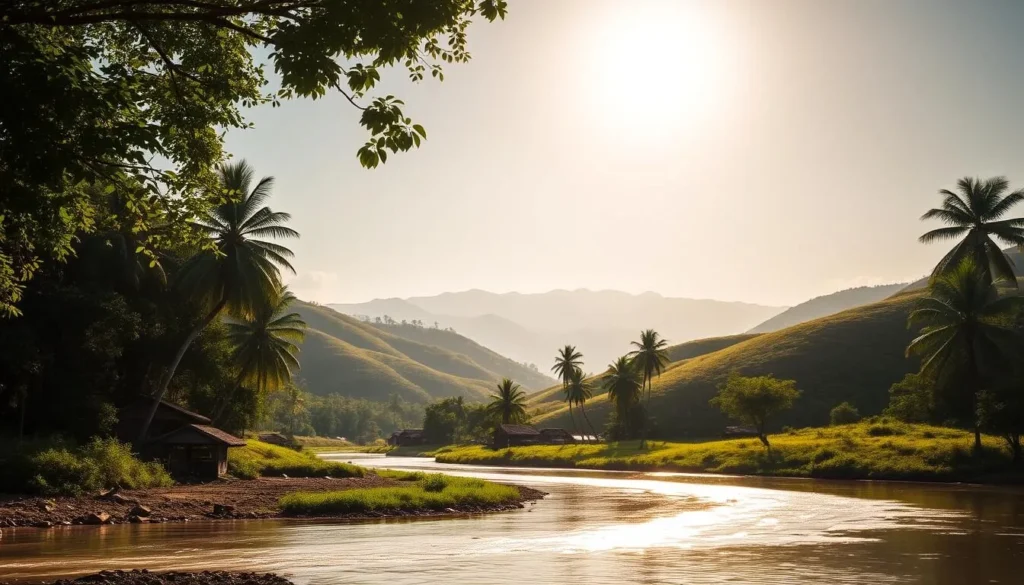
Brief History and Cultural Background
The history of Montsinery Tonnegrande is deeply intertwined with French Guiana’s colonial past. The area was first inhabited by indigenous communities, who lived in harmony with the natural environment for centuries. The arrival of European colonizers led to the establishment of plantations and the introduction of enslaved people, whose descendants now form part of the region’s rich cultural tapestry.
After the abolition of slavery in 1848, the demographic makeup of the region shifted, with former slaves establishing independent communities. Today, Montsinery Tonnegrande’s culture reflects a blend of indigenous, African, European, and Asian influences, visible in local customs, cuisine, and daily life.
| Aspect | Description |
|---|---|
| Indigenous Influence | Native communities’ traditions and way of life |
| African Influence | Cultural practices brought by enslaved people and their descendants |
| European Influence | Colonial legacy and European customs |
| Asian Influence | Cultural exchange and traditions introduced by Asian immigrants |
When to Visit Montsinery Tonnegrande
The time you choose to visit Montsinery Tonnegrande can significantly impact your trip. French Guiana is hot and humid almost all year, but there are optimal periods to plan your tour.
Best Seasons for Travelers
The best season to visit Montsinery Tonnegrande is during the dry season, from July through November. This period offers more comfortable traveling conditions compared to the rest of the year.
Avoid the months of April through June if possible, as heavy downpours and high humidity can make traveling uncomfortable.
Weather Patterns and What to Pack
Montsinery Tonnegrande experiences a tropical climate with high humidity year-round. To prepare, consider the following essentials:
- Lightweight, breathable clothing for comfort in the tropical heat.
- Waterproof gear, including a rain jacket and waterproof bag covers, to handle sudden downpours during the rainy season.
- Sun protection, such as high-SPF sunscreen, sunglasses, and a wide-brimmed hat, for outdoor activities.
- Insect repellent with high DEET content to protect against mosquitoes and other insects.
- Sturdy, closed-toe shoes with good traction for hiking and outdoor activities, especially after rain.
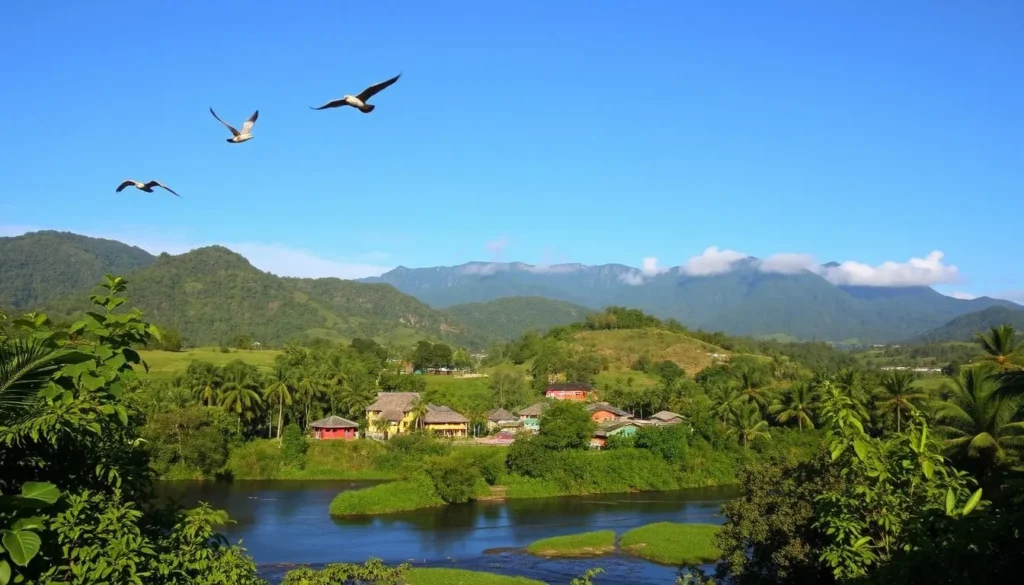
How to Get to Montsinery Tonnegrande
To experience the best of Montsinery Tonnegrande, you need to know how to get there and navigate the area. Located about 12 miles west of Cayenne, the capital city of French Guiana, Montsinery-Tonnegrande is accessible through various transportation options.
Transportation Options from Cayenne
When traveling from Cayenne, you have several choices to reach Montsinery Tonnegrande. The most convenient way is by road, which takes approximately 30 minutes by car or taxi. Public transportation is also available, including buses that regularly ply the route between Cayenne and Montsinery Tonnegrande.
| Transportation Mode | Duration | Cost |
|---|---|---|
| Car/Taxi | 30 minutes | Moderate |
| Public Bus | 45 minutes | Low |
Local Transportation Tips
Once you arrive in Montsinery Tonnegrande, navigating the local places is relatively straightforward. Walking is a practical option for exploring the central areas of both Montsinery and Tonnegrande settlements. For more remote areas, consider hiring a local guide with transportation or renting a bicycle for a more eco-friendly approach. River transportation via traditional pirogues is also available for reaching riverside attractions.
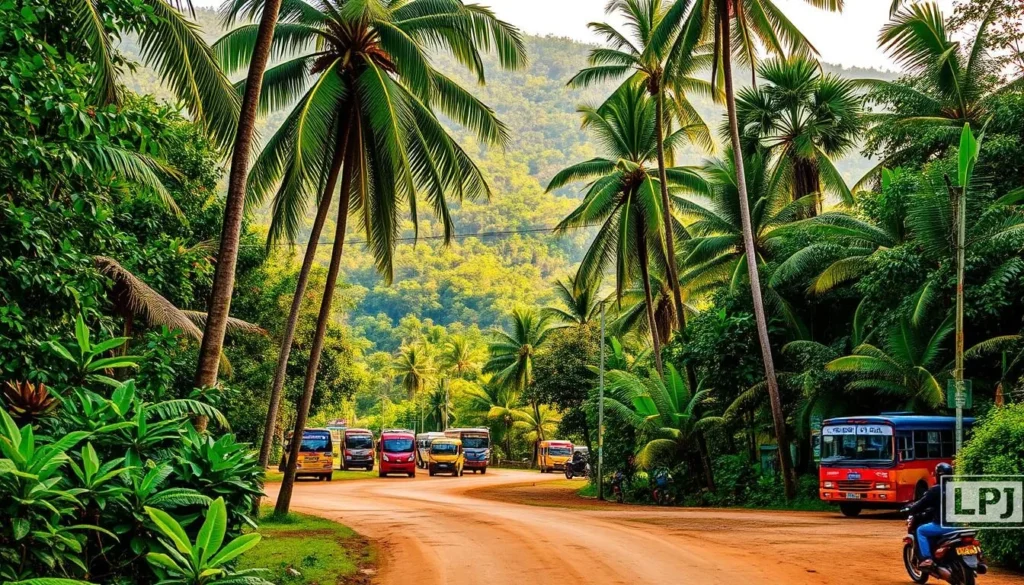
Explore the Tonnégrande River
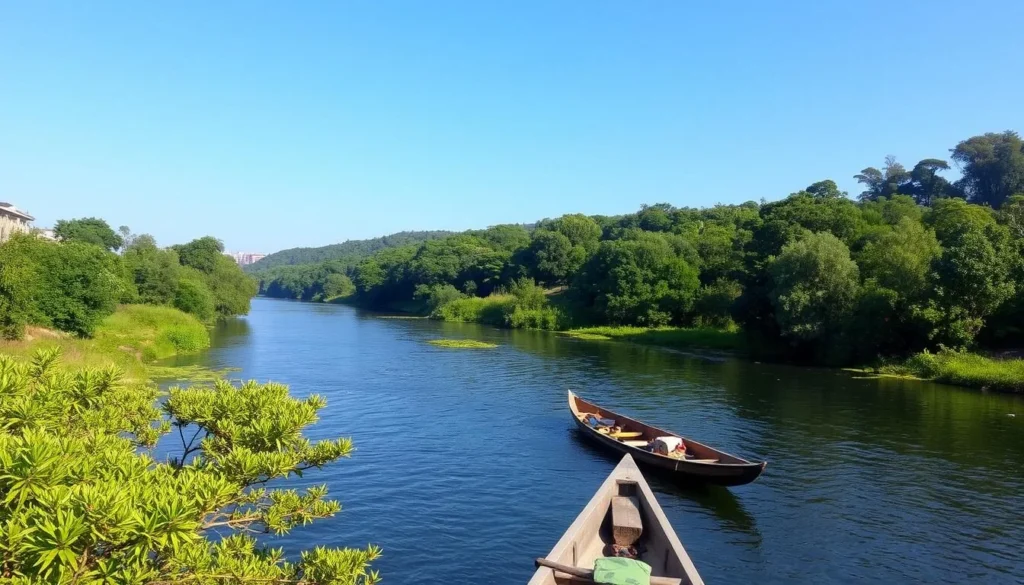
In the lush landscapes of French Guiana, the Tonnégrande River stands out as a premier spot for wildlife and adventure. The river’s tranquil waters and surrounding rainforest create a perfect habitat for a diverse range of wildlife, making it an ideal location for nature lovers and explorers.
Pirogue Tours Through the Jungle
Embark on a Pirogue tour through the Tonnégrande River, and you’ll be immersed in the heart of the jungle. These traditional wooden canoes allow you to navigate the river’s calm waters, offering a unique perspective on the surrounding ecosystem. As you glide along, the lush canopy above and the sounds of the rainforest will envelop you, creating an unforgettable experience.
Wildlife Spotting Opportunities
The Tonnégrande River ecosystem is teeming with animals, including various monkeys like squirrel monkeys that can be seen on Îlet la Mère. The riverbanks are home to capybaras, the world’s largest rodents, which can be spotted during early morning or late afternoon. The river corridor is also a haven for birdwatchers, with sightings of kingfishers, toucans, and various raptor species. Keep an eye out for caimans and other reptiles, though they can be elusive and are best spotted with a local guide.
Hiking the Tropical Forests
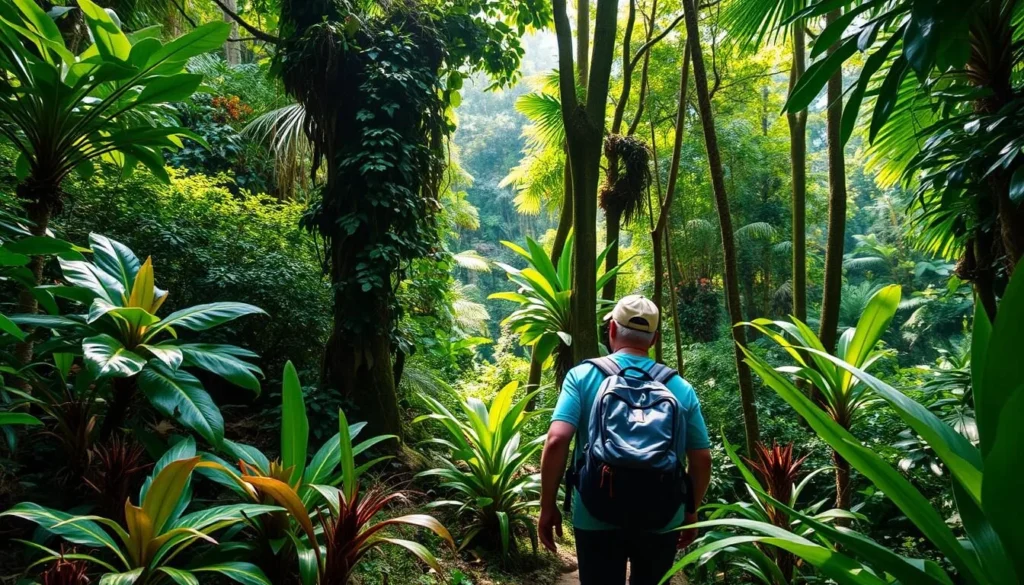
The tropical forests of Montsinery Tonnegrande offer some of the most exhilarating hiking experiences. As you trek through the dense foliage, the sounds and sights of the forest come alive.
Popular Trails and Routes
One of the most scenic trails is the five-kilometer Rorotá Trail, which ascends Mahury Mountain. This trail is known for its stunning views and the chance to see wildlife such as sloths clinging to the trees.
The forests are home to a diverse range of animals, including the golden-handed tamarin, a small monkey species endemic to the Guiana Shield region.
Flora and Fauna to Look For
The forests of Montsinery Tonnegrande are characterized by towering emergent trees that can reach heights of over 40 meters. The distinctive buttress roots of many rainforest trees provide stability and create microhabitats for smaller forest animals.
As you hike, look for orchids, bromeliads, and other epiphytes that cling to tree branches, creating aerial gardens that support their own miniature ecosystems.
Visit Local Hmong Villages
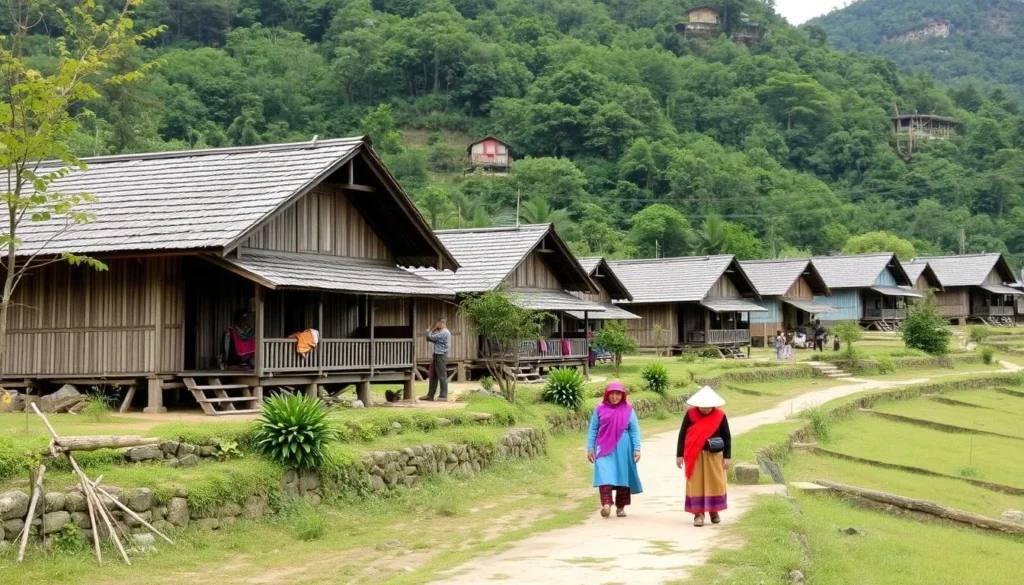
The Hmong villages near Montsinery Tonnegrande are a treasure trove of cultural heritage and traditional crafts. You can visit these villages to experience the rich Hmong culture and traditions. A tour of the villages will give you insight into the daily lives of the Hmong people.
Cultural Experiences and Traditions
Visiting the Hmong villages provides a unique opportunity to engage with the local culture. You can participate in traditional activities and witness the vibrant cultural practices firsthand. The villages are known for their strong sense of community and traditional ways of life, making them a fascinating place to explore.
Handicrafts and Local Products
The Hmong are renowned for their exquisite handicrafts, including intricate embroidery, silverwork, and bamboo weaving. You can purchase these authentic crafts directly from the artisans, supporting the local economy. Additionally, the villages offer a variety of local food products, such as preserves, honey, and traditional sauces, making for excellent souvenirs.
By visiting the Hmong villages, you not only enrich your travel experience but also contribute to the preservation of Hmong cultural heritage. The villages are a must-visit destination in Montsinery Tonnegrande, offering a memorable and enriching experience.
Birdwatching Paradise
As you explore Montsinery Tonnegrande, you’ll discover it’s a haven for bird enthusiasts. The region’s lush forests and diverse ecosystems make it an ideal location for spotting a wide variety of bird species.
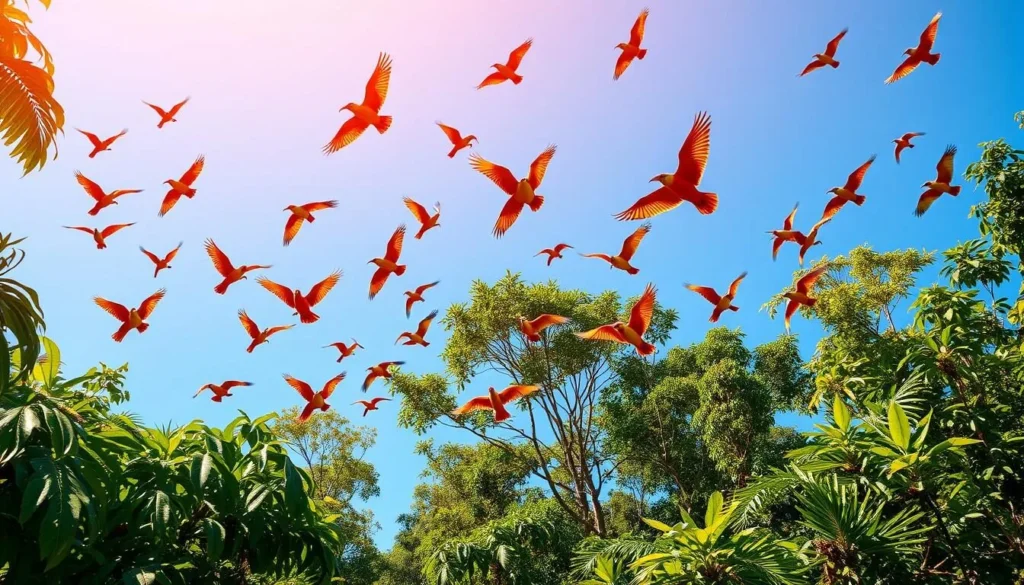
Best Spots for Birdwatching
The forests around Montsinery Tonnegrande are home to numerous birdwatching spots. You can explore the tall emergent trees where various birds nest and feed. The Tonnégrande River and its surrounding wetlands also offer excellent opportunities to observe birds in their natural habitat.
Notable Bird Species to Observe
While exploring Montsinery Tonnegrande, keep an eye out for the harpy eagle, one of the world’s most powerful birds of prey, though sightings are rare. More commonly, you’ll spot colorful toucans, including the channel-billed toucan, and various parrot species like the festive parrot and mealy amazon. The sunbittern, with its striking plumage, can be seen along waterways, and hummingbirds such as the crimson topaz and tufted coquette add flashes of color as they flit between flowering plants.
- The forests echo with the calls of various parrot species.
- Hummingbirds are well-represented, adding flashes of iridescent color.
Cycling Through Rural Landscapes
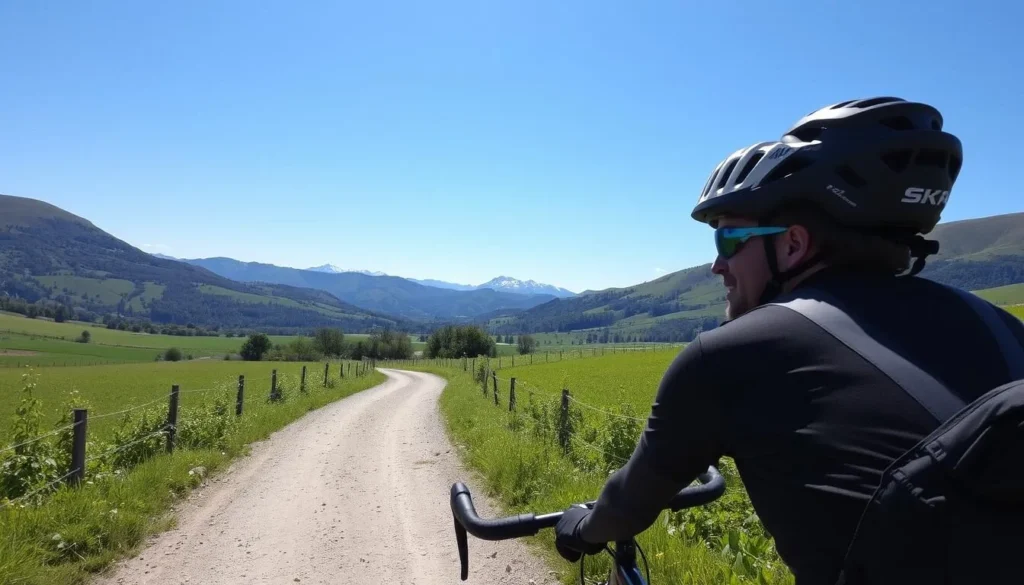
Montsinery Tonnegrande’s rural landscapes are best experienced on two wheels, where the pace is leisurely and the scenery is breathtaking. Cycling through this region offers a unique blend of natural beauty and cultural immersion, allowing you to explore the countryside at your own pace.
Recommended Routes
For a memorable cycling experience, consider taking the road to Matoury or heading towards Roura or the Cacao village. The Cacao village, in particular, is a fascinating destination, known for its Laotian refugee community since the 1970s. Visiting on a Sunday, you can combine your cycling trip with a visit to the local market, where you can find unique handicrafts and traditional foods.
Safety Tips and Equipment
When cycling in Montsinery Tonnegrande, safety should be your top priority. Here are some key tips to ensure a safe and enjoyable trip:
- Always carry plenty of water to stay hydrated, aiming for at least one liter per hour of riding.
- Ensure your bicycle is well-maintained, with particular attention to reliable brakes.
- Wearing a helmet and high-visibility clothing is strongly recommended.
- Plan your trip to avoid the midday heat; early morning departures are best.
- Inform someone of your intended route and expected return time.
By following these guidelines, you can have a safe and enjoyable cycling experience, making the most of your trip to Montsinery Tonnegrande and enriching your life with unforgettable memories.
Montsinery Tonnegrande, French Guiana: Best Things to Do – Top Picks
From adventure activities to cultural experiences, Montsinery Tonnegrande has something for every kind of traveler. This charming destination in French Guiana is a place where you can explore the great outdoors and immerse yourself in the local culture.
Adventure Activities
You can start your adventure with a thrilling pirogue tour through the jungle, navigating the Tonnégrande River and spotting the diverse wildlife that calls this region home. For those who love hiking, the tropical forests offer numerous trails that wind through the lush landscape, providing opportunities to observe the exotic flora and fauna up close.
For a more leisurely activity, consider cycling through the rural landscapes, taking in the sights and sounds of the countryside. You can also visit the local Hmong villages, where you can learn about the traditional ways of life and interact with the friendly people.
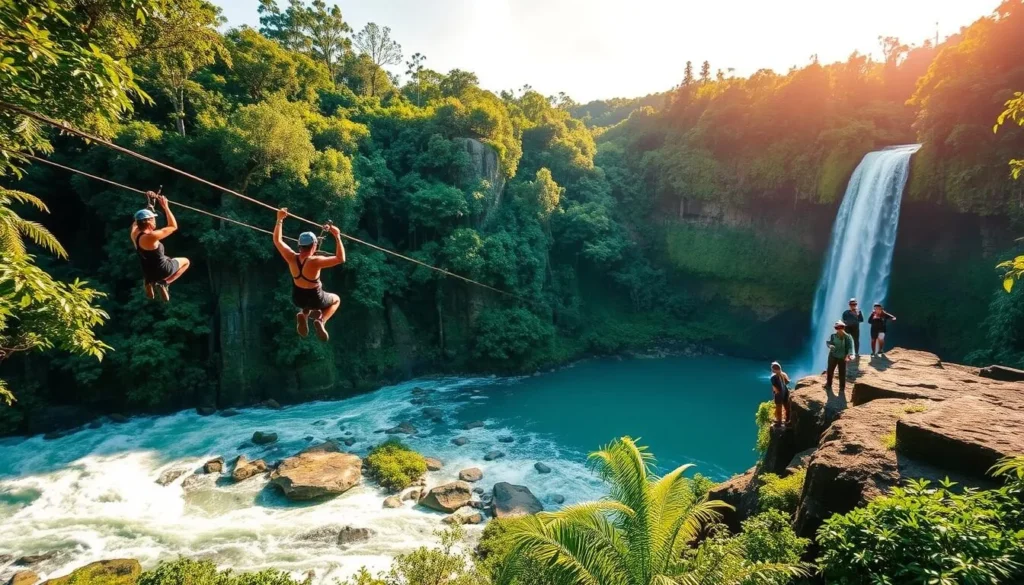
| Activity | Location | Duration |
|---|---|---|
| Pirogue Tour | Tonnégrande River | 2 hours |
| Hiking | Tropical Forests | Half-day |
| Cycling | Rural Landscapes | Full-day |
Cultural Experiences
Montsinery Tonnegrande offers a wealth of cultural experiences that provide insight into the diverse communities that call this place home. You can participate in cooking workshops with local families, learning about traditional Creole and Hmong cuisine and preparing authentic dishes.
The region is also known for its vibrant cultural festivals, which take place throughout the year and celebrate the diverse heritage of French Guiana. You can visit traditional cassava processing facilities to learn about the importance of this staple crop in local diets and food preparation techniques.
Interactions with community elders, arranged respectfully through local guides, can provide valuable perspectives on the history and changing way of life in this evolving region, giving you a deeper understanding of the local people and their culture.
Local Cuisine and Dining Options
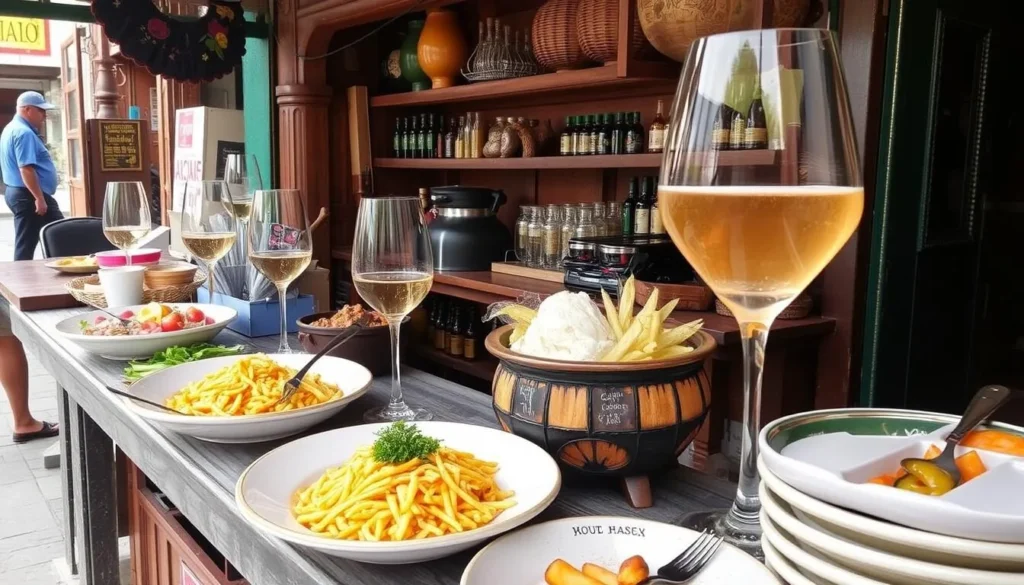
When visiting Montsinery Tonnegrande, be sure to indulge in the local cuisine that showcases the region’s rich cultural diversity. The area offers a wide range of dining experiences, from simple family-run establishments to more formal restaurants, each providing a unique culinary experience.
Traditional Dishes to Try
French Guiana’s cuisine is a reflection of its cultural melting pot, featuring dishes such as Awara broth, a palm-pulp concoction, and “Blaff,” a tomato-based broth with peppers and fish. You should also try staples like rice and beans with local game meat, as well as traditional stews and seafood dishes such as bouillon d’aurora.
Awara broth and Blaff are must-try dishes that embody the local flavors.
Best Restaurants and Food Stalls
Dining options in Montsinery Tonnegrande range from simple eateries to formal restaurants. Chez Maryse in central Montsinery is renowned for its authentic Creole cuisine, serving generous portions of fresh fish in coconut sauce and locally raised chicken with regional spices.
For a more immersive dining experience, visit the weekend food markets where local vendors sell grilled meats, fresh fruit juices, and traditional desserts. You can also explore Hmong restaurants offering Southeast Asian cuisine, featuring dishes like steamed fish with herbs and sticky rice.
Day Trip to Cacao Village
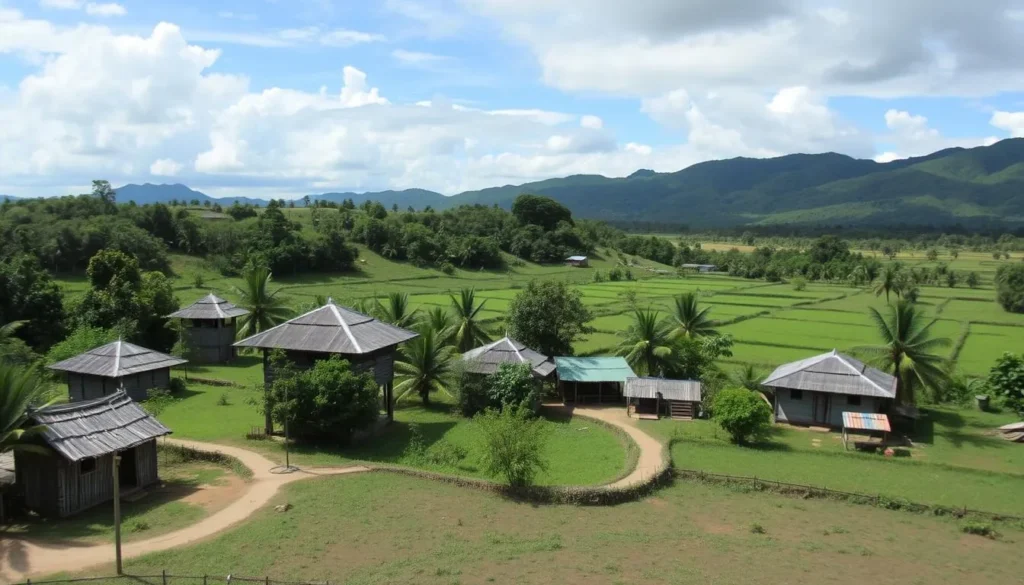
Explore the charming Cacao Village, a popular day trip from Cayenne. Located on the Comté River, this small Asian village is known for its wooden stilt houses and vibrant culture. The village is home to Hmong refugees who were transplanted from Laos in the 1970s.
Sunday Market Experience
Visit Cacao Village on a Sunday to experience the bustling market, featuring Hmong embroidery and weaving, as well as local noodle soups. The market is a great place to immerse yourself in the local culture and try traditional foods.
Chocolate Making Workshops
Cacao Village offers visitors the opportunity to learn about chocolate production through hands-on workshops. Local cacao farmers lead educational tours of their plantations, explaining the history of cacao in the region. Participants can learn the art of roasting, grinding, and tempering chocolate, and sample chocolates made from local beans, appreciating the unique terroir of this place.
Wildlife Encounters in Montsinery Tonnegrande
Wildlife encounters are a highlight of any visit to Montsinery Tonnegrande, with opportunities to see a wide range of animals in their natural habitats. The region’s diverse ecosystem supports a rich variety of wildlife, making it an ideal destination for nature enthusiasts and adventure seekers alike.
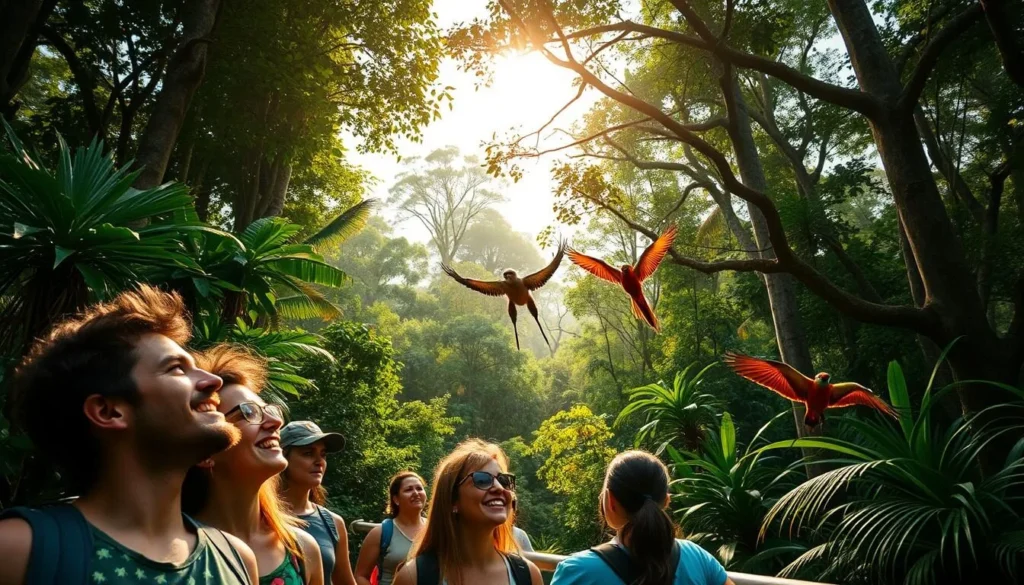
Spotting Monkeys and Sloths
As you venture into the lush forests of Montsinery Tonnegrande, keep an eye out for agile monkeys and slow-moving sloths. The region’s dense canopy is home to a variety of primate species, including howler monkeys and capuchin monkeys. While exploring the forest trails, you might catch a glimpse of these fascinating creatures as they forage for food or laze about in the trees.
Guided tours can significantly enhance your chances of spotting these elusive animals, as knowledgeable guides can lead you to the best viewing spots.
Caiman Watching Excursions
A tour along the Tonnégrande River at night offers a thrilling experience, as you can observe caimans in their natural habitat. Caiman watching excursions typically take place under the cover of darkness, when these reptiles are most active and their eyes reflect the light from spotlights with an eerie red glow.
- Black caimans, the largest predators in the region’s waterways, can be observed from the safety of boats guided by experienced local tour operators.
- Spectacled caimans, a smaller species, are more commonly seen in the quieter tributaries and marshy areas around the Tonnegrande River.
- Responsible tour operators maintain a respectful distance from these animals to minimize disturbance to their natural behaviors.
Visiting Nearby Beaches
The beaches near Montsinery Tonnegrande offer a unique blend of natural beauty and wildlife encounters. While Montsinery Tonnegrande itself doesn’t have turtle nesting beaches, several important nesting sites are accessible as day trips.
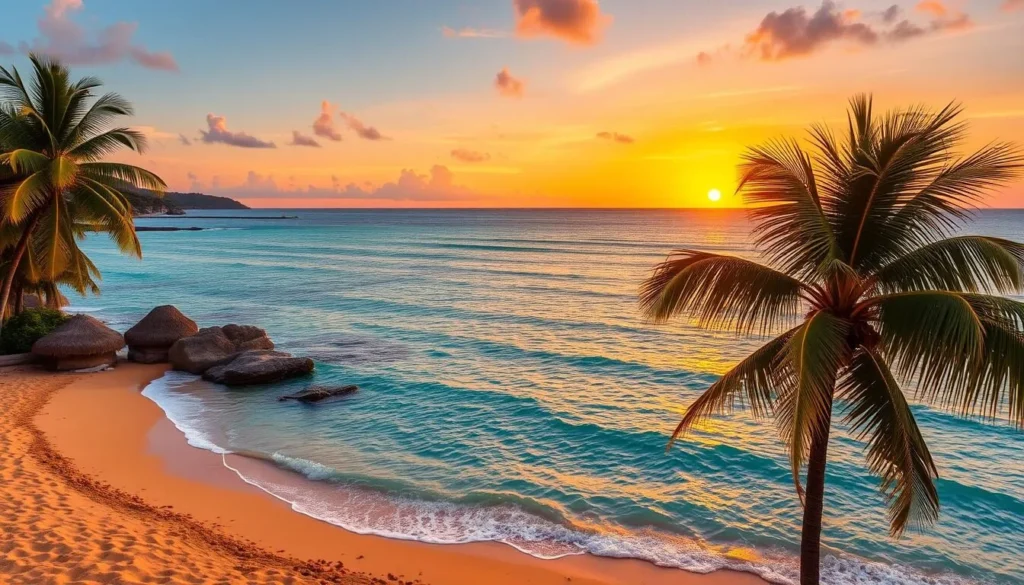
Remire-Montjoly Beach
Remire-Montjoly Beach is one of the accessible beaches near Montsinery Tonnegrande, known for its scenic beauty. It serves as a nesting site for leatherback, green, and olive ridley turtles during the nesting season, which typically runs from April through August.
Turtle Nesting Sites
For a truly spectacular turtle nesting experience, consider a longer excursion to Plage les Hattes at Awala-Yalimapo, recognized as one of the most important leatherback turtle nesting sites in the world. During the peak season, more than 80 leatherbacks can be seen lumbering up the beach in a single night.
Guided turtle watching tours are conducted in the evenings during nesting season, with strict protocols in place to minimize disturbance to these endangered creatures. Witnessing the turtles laying eggs or the hatchling emergences can be a truly unforgettable experience.
Accommodation Options in Montsinery Tonnegrande
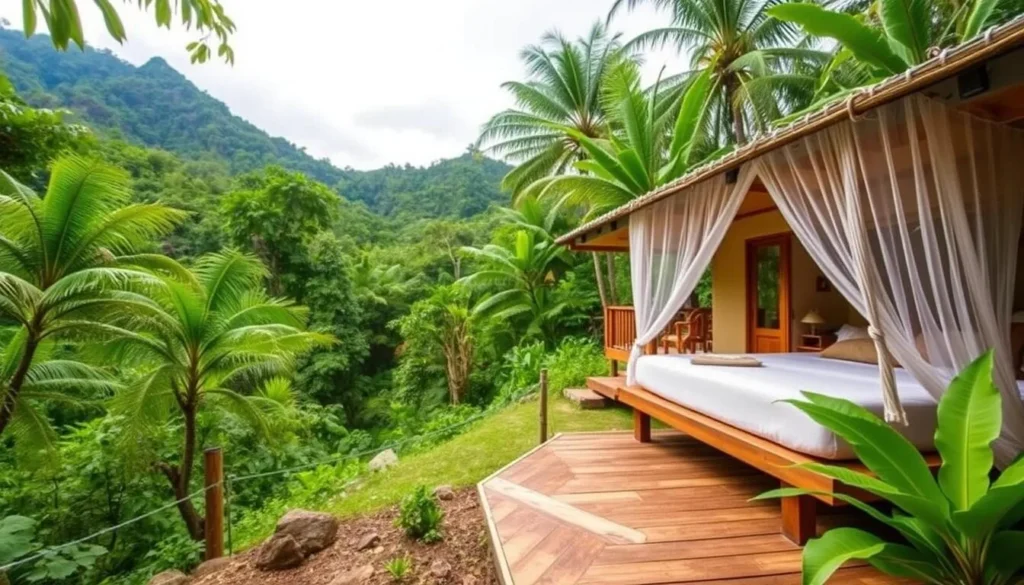
When planning your trip to Montsinery Tonnegrande, choosing the right place to stay is crucial for a memorable visit. The area offers a variety of accommodations catering to different preferences and budgets.
Eco-Lodges and Jungle Retreats
Eco-lodges and jungle retreats in Montsinery Tonnegrande provide a unique experience, allowing you to immerse yourself in nature. These accommodations often feature sustainable practices and offer activities like guided jungle tours.
Staying in an eco-lodge not only supports local conservation efforts but also gives you a chance to disconnect from the hustle and bustle of city life.
Budget-Friendly Stays
For budget-conscious travelers, Montsinery Tonnegrande offers several affordable accommodation options. Guesthouses in the main settlement provide simple, clean rooms, often with shared facilities and common areas where you can socialize with other travelers.
Homestay opportunities with local families are also available, offering cultural immersion, home-cooked meals, and insider knowledge about the best places to visit in the area. For the more adventurous, camping facilities along the Tonnegrande River provide an economical option for those who bring their own equipment.
Practical Travel Tips for Montsinery Tonnegrande
To make the most of your time in Montsinery Tonnegrande, French Guiana, understanding a few key travel tips is crucial. Whether you’re exploring the jungle, visiting local villages, or simply enjoying the natural beauty, being prepared will enhance your experience.
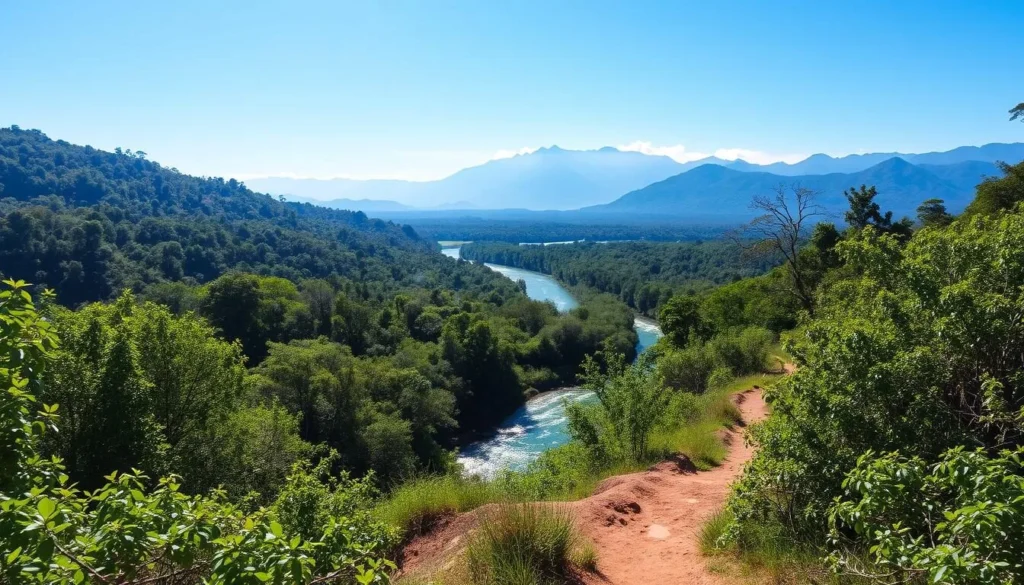
Safety Considerations
While French Guiana has relatively low crime rates, it’s always wise to exercise caution, especially in remote areas and after dark. Avoid carrying large amounts of cash or valuables, and be mindful of your surroundings. This will help ensure a safe and enjoyable trip.
Language and Communication
French is the official language, and most people in Montsinery Tonnegrande speak it. Having some basic French phrases will greatly enhance your travel experience. In more remote areas, Creole is commonly spoken, and in Hmong communities, their native language is used among themselves, though they typically speak French with visitors. Since English is not widely spoken outside of tourism professionals, consider downloading a translation app for offline use.
Additionally, mobile phone coverage is generally reliable in main settlements but can be spotty in remote areas and along hiking trails. Internet access is available at most accommodations, though speeds may be slower and service intermittent, especially during heavy rainfall.
Conclusion
Your visit to Montsinery Tonnegrande is more than just a trip; it’s an immersion into the natural beauty and rich heritage of French Guiana. This destination offers a perfect blend of natural wonders and cultural experiences, making it an ideal location for travelers seeking authentic adventures.
From river tours where you can spot wildlife like monkeys and caimans, to cultural immersion in Hmong villages, Montsinery Tonnegrande provides a diverse range of activities. The area’s relatively undeveloped tourism infrastructure means you can enjoy pristine environments and genuine interactions without the crowds.
Whether you’re visiting for a day trip from Cayenne or staying longer to explore the forests, rivers, and beaches, Montsinery Tonnegrande rewards travelers with unforgettable memories. As eco-tourism continues to develop, visiting now allows you to contribute to sustainable development that preserves both natural environments and cultural heritage.
The unique combination of French administrative structure with Amazonian wilderness makes Montsinery Tonnegrande a fascinating destination. It’s a truly one-of-a-kind way to experience the natural and cultural richness of this often-overlooked region.
—
The above is subject to change.
Check back often to TRAVEL.COM for the latest travel tips and deals.
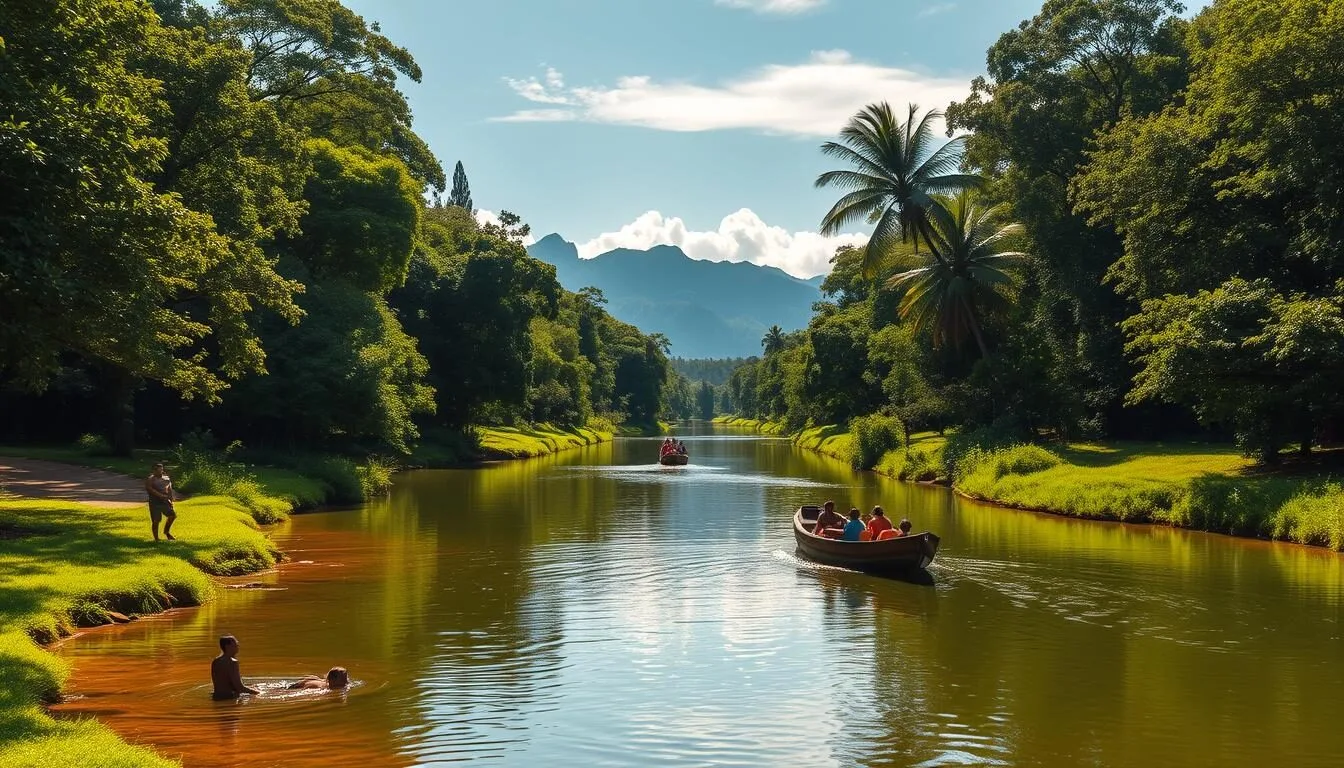
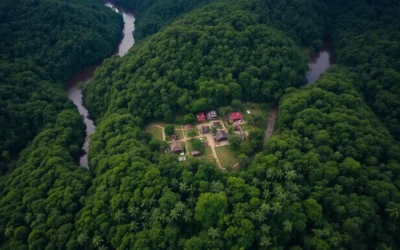
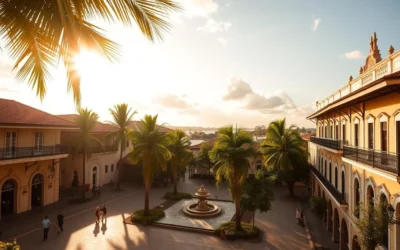
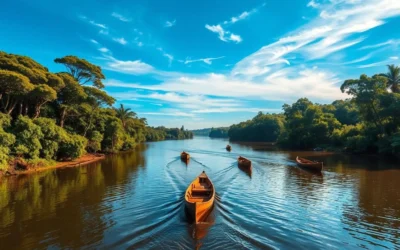
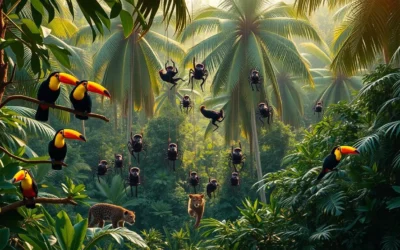
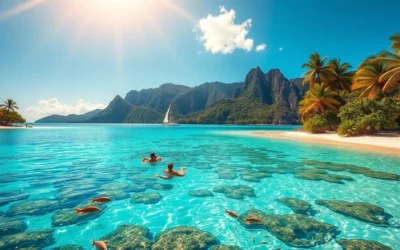
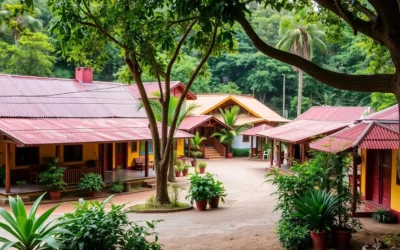
0 Comments